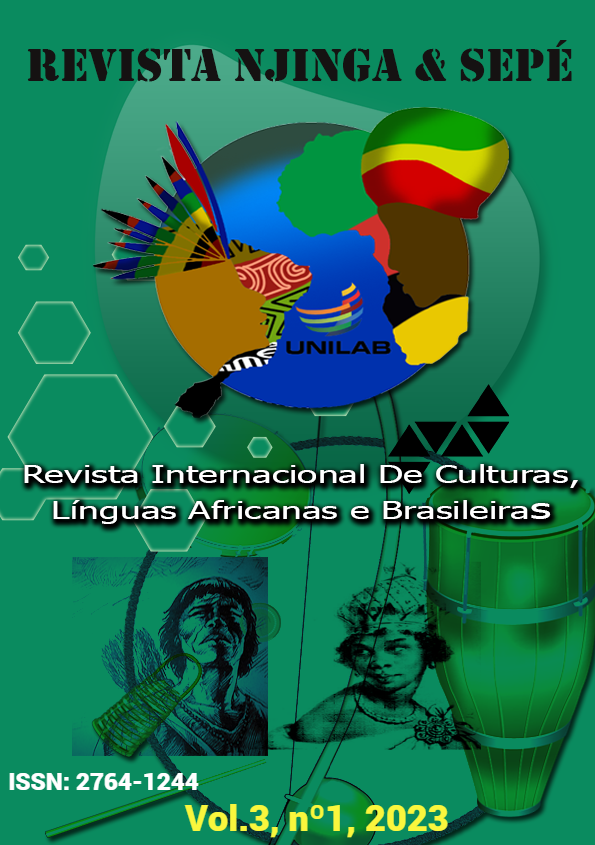Variation of Citshwa
comparative analysis of Cihlengwe spoken in Massinga and Cimhandla of Vilankulo district – Mozambique
Keywords:
linguistic variation, Citshwa, Cihlengwe, Cimhandla.Abstract
Taking into account the phonetic-phonological, morphosyntactic and discursive analysis, the study describes the linguistic and extralinguistic factors that contribute to the variation and/or linguistic change in Citshwa (S.51). Integrated in the Theoretical-Descriptive Linguistics of Bantu, the study is based on the methodological model of the Variationist Sociolinguistics of Labov (1972) and analyzes the variations of Citshwa, focusing on Cihlengwe, spoken in the district of Massinga and Cimhandla, spoken in Vilankulo district in Inhambane province, in the southern region of Mozambique. The problem that arises is the following: what factors contribute to the variation of Citshwa? What are the most common variations between Cihlengwe and Cimhandla? Regarding the methodology, during the research, the data were collected within the months of February to March 2021 and analyzed qualitatively. As for data generation, the following methods were adopted: bibliographic research, observation, interview and questionnaire, which contained the basic vocabulary of Citshwa. Regarding data analysis, the comparative method and the introspective method were adopted. Thus, after analyzing and discussing the data, it was found that the most frequent variations of Citshwa are at the phonetic-phonological, morphosyntactic, lexical and discursive levels. With regard to factors, the study proved that the variation of Citshwa is conditioned by linguistic factors (contact of languages, interference from other languages) and extralinguistic factors (social, geographical location of Vilankulo and Massinga districts).
Downloads
References
Bagno, M.; Rangel, N. (2005). Tarefas da educação linguística no Brasil. Rev. Brasileira de Linguística Aplicada, v. 5, n. 1, p. 63-81.
Bartoni-Ricardo, S. M. (2014). Manual de sociolinguística. São Paulo: Editora Contexto.
Becker, F. (1994). Modelos pedagógicos e modelos epistemológicos. Revista Educação e Realidade, v. 19, n. 1, p. 32-42.
Bortoni-Ricardo, S. M. (2004). Educação em língua materna: a sociolinguística na sala de aula. São Paulo: Parábola Editorial.
Carvalho, J. E. (2009). Metodologia do trabalho científico: saber fazer da investigação para dissertações. 2.ed. Lisboa: Editora Escolar.
Cezario, M. M.; Votre, S. (2008). Sociolinguística. In: Martelota, M. E. (Org.). Manual de Linguística. São Paulo: Editora Contexto, p. 142-154.
Coan, M.; Freitag, R. M. (2010). Sociolinguística variacionista: pressupostos teórico-metodológicos e propostas de ensino. Revista Electrónica de Linguística, v. 4, n° 2, p. 173-194.
Correia, M.; Lemos, L. S. P. (2005). Inovação Lexical em Português. Lisboa: Edições Colibri.
De Deus, V. G; Machado, D. M. (2010). Linguística:estudo e ensino. Universidade Tiradentes (UNIT): NEAD.
De Saussure, F. (2006). Curso de Linguística Geral. São Paulo: Cultrix.
Firmino, G. (2006). A Questão Linguística na África Pós-Colonial: O caso do Português e das Línguas Autóctones em Moçambique. Maputo: Textos Editores.
Gil. A. (2008). Métodos e Técnicas de pesquisa social. 6ª ed. São Paulo.
Gorski, E. M.; Coelho, I. L. (2009). Variação linguística e ensino de gramática. Work. pap. linguíst., Florianópolis, v. 10, n.1, p. 73-91.
Görski, E. M.; Valle, C. R. M. (2016). Variação discursiva: procedimentos metodológicos para delimitação do envelope de variação. In: Freitag, R.; Gorski, C. S.; Görski, E. M. (Org.). Sociolinguística e a política linguística: olhares contemporâneos. São Paulo: Blucher, p. 79-99.
Gundane, L. (2019). Política linguística: educação inclusiva em contextos de diversidade linguística e cultural em Moçambique. Revista científica da UEM: Série. Ciências Sociais, v. 1, n. 2, p. 112-125.
Guthrie, M. (1967/71). The Classification of the Bantu Languages. London: IAI.
Hudson, R. A. (1980). Sociolinguistics. Cambridge: Cambridge University Press.
INSTITUTO NACIONAL DE ESTATÍSTICA (2019). IV Recenseamento Geral da População e Habitação, 2017: Resultados Definitivos – Moçambique, Maputo: INE.
Labov, W. (1972). Sociolinguistic patterns. Philadelphia: University of Pennsylvania Press.
Marconi, M. A.; Lakatos, E. M. (2003). Metodologia Científica. 5.ed. São Paulo: Atlas
Ludke, M.; André, M. E. (1988). Pesquisa em educação: abordagens qualitativas. São Paulo: EPU.
Mateus, M. H. M. et al. (2003). Gramática Da Língua Portuguesa. Lisboa: Ed. Caminho.
May, T. (2004). Pesquisa social: questões, métodos e processos. 3.ed. trad. Carlos Soares Porto Alegre: Artmed.
Michel, M. H. (2005). Metodologia e pesquisa científica em ciências sociais: um guia prático para acompanhamento da disciplina e elaboração de trabalhos monográficos. São Paulo: Atlas.
Ngunga, A. (2012). Interferências de Línguas Moçambicanas em Português falado Moçambique.Revista Científica da UEM, v. 1, n.1, p. 7-20.
Ngunga, A.; Faquir, O. (2011). Padronização da ortografia de línguas moçambicanas: relatório do III seminário. Maputo: CEA – UEM.
Nhampoca, E. (2015). Ensino bilingue em Moçambique: introdução e percursos. Work. Pap. Linguíst., nº. 16, v.2. Florianópolis, p. 82-100.
Ruiz, J. A. (2009). Metodologia científica: guia para eficiência nos estudos. 6.ed. São Paulo: Atlas.
Salomão, A. C. (2011). Variação e mudança linguística: panorama e perspectivas da sociolinguística variacionista no Brasil. Fórum Linguístico, Florianópolis, v. 8, n. 2, p. 187-207.
Vergara, S. C. (2010). Projectos e relatórios de pesquisa em administração. 12.ed. São Paulo: Atlas.
Viotti, E. (2013). Mudança linguística. In: Fiorin, J. L. (Org.) Linguística o que é isto? São Paulo: Contexto, p. 137-79.
Downloads
Published
How to Cite
Issue
Section
License
Copyright (c) 2022 NJINGA&SEPÉ: Revista Internacional de Culturas, Línguas Africanas e Brasileiras

This work is licensed under a Creative Commons Attribution-NonCommercial-NoDerivatives 4.0 International License.
Authors who publish in this journal agree to the following terms:
Authors maintain copyright and grant the journal the right to first publication, the work being simultaneously licensed under the Creative Commons Attribution License, which allows the sharing of the work with recognition of the authorship of the work and initial publication in this magazine.
Authors are authorized to assume additional contracts separately, for non-exclusive distribution of the version of the work published in this journal (eg, publishing in institutional repository or as a book chapter), with acknowledgment of authorship and initial publication in this journal.
Authors are permitted and encouraged to publish and distribute their work online (eg in institutional repositories or on their personal page) at any point before or during the editorial process, as this can generate productive changes, as well as increase impact and citation of the published work (See The Effect of Open Access).




